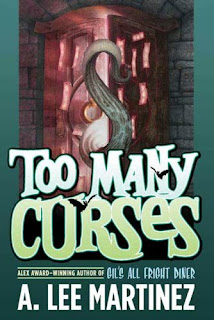Okay, back from the wars, I think we can understand that the
blog should be running properly now, so that’s for the best.
As I said last week, I’ve been reading a lot of books by the
illustrious A. Lee Martinez, purveyor of unusual humor and really unique world
building. The two books currently in question are Too Many Curses and A
Nameless Witch. The first is about a kobold in service to an evil wizard,
who is at a loss for what to do when her master dies, and finds herself
struggling to control and save a magical castle full of cursed heroes. It’s
very good, and quite odd.
The second is also both good and odd. It follows a slightly
undead witch who has to cover up her inhuman beauty in order to be more
witchly, and finds herself embroiled in the plot of an evil sorcerer. There’s
adventure, knights, and a demonic duck – all very enjoyable and quite off.
But it’s not the plots of these stories that really got me.
I mean, they’re good plots, there’s no denying that. But they’re also pretty
easily replicated. Standard bonkers fantasy stuff. I mean, it is just off the
beaten path of swords and sorcerers, but it’s still pretty standard as it goes.
There’s a courageous heroine, a task too big for her, and a bunch of unusual
helpers to get her through.
So why do I love these books so freaking much, and why do I
have a strong tendency to judge the fantasy books I do read against everything
in the A. Lee Martinez canon (he’s fabulous, really, you should totally read
his stuff)?
Simple. Because he writes stories about heroes and heroines
(but mostly heroines) who are, at their simplest level, incredibly
level-headed.
I am aware that this sounds very dull and basic, but trust
me when I say that it really isn’t. It’s actually the best thing in the world.
Your average hero in any story, but especially in a
science-fiction or fantasy epic, needs a quality that will get them embroiled
in the plot in the first place. They have to have a reason to go on some epic
quest after some stupid macguffin. After all, if The Hobbit taught us anything, it’s that most people like leading
quiet comfortable lives, and it takes quite a bit to pry them away.
As a result of this simple fact of storytelling, most writers
default to the easy answer. They make their hero somewhat impetuous, brash, and
more than a little foolhardy. He’s very easily taunted into starting a quest,
and once begun, the hero has little choice but to follow through. Since he is
rather a silly person to begin with, it then follows perfectly that he’ll go
about it all the wrong way, leading to mishaps and misunderstandings and a rollicking
good adventure, right?
Yes, that is true. All of those things do create a story
atmosphere that is sure to be pretty entertaining. But here’s the bit you might
not immediately see: making your hero an idiot just in order to advance the
plot isn’t actually good writing. There are much better ways to go about this.
For example, making the hero incredibly sensible. What a lot
of writers tend to misunderstand is that the idiots rushing off into danger
aren’t the only people who end up on epic journeys. There are also the dull,
sensible folks who happen to realize that an epic journey is the best way to
solve their problems. And, frankly, after years of brave idiots, I tend to
enjoy a nice sensible hero as a palate cleanser.
That’s where Nessie (the kobold) and the Nameless Witch come
in. They are both, to a fault, sensible creatures. Nessie is, in fact, defined
by this. When the wizard dies and the castle starts to come alive, Nessie’s
reaction isn’t to fling herself into danger, it’s to keep on dusting and caring
for the cursed creatures, and assuming that if something bad is going to
happen, it’s going to happen whether she worries or not. Which is true.
It makes for a more exciting story, too. Instead of the
impetuous hero and his ability to find trouble even in a bathroom, the sensible
hero is forced to interact with the real circumstances already there. Because
they won’t go dashing off into danger, the onus is on the writer to create a
more thoughtful and complicated story to entice them. You keep reading because
the sensible hero is slowly solving problems, and the problems have to get bigger
in order to present a challenge.
And, of course, sensible heroes make for much better role
models.
I mean, who doesn’t love the silly and troublemaking antics
of a good hero? But when it comes down to someone who I’d actually like to
emulate, I’d really rather be Nessie or the Witch. I want to live to the end of
my story. Sure, I want adventure and epicness and heroics, but I also want to
not be an idiot about it.
There’s room for both types of stories in this world. The
difference is that most people don’t tend to remember that the sensible hero
really is an option. They assume that anyone who goes on a quest would have to
be mad, and they write accordingly. But that just isn’t true. Quests happen to
anybody, and the cool thing is seeing how we all react.
 |
| But seriously, guys, I can't recommend his stuff enough. It's hilarious. |




I need to read this stuff.
ReplyDeleteYes you do.
DeleteDitto.
ReplyDelete*cackles madly* But yeah, you'd especially like his stuff.
Delete